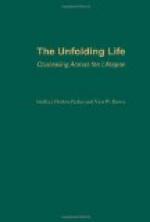Second, Friction, in which defiance and stubbornness appear. The severest test which could be imposed upon adults would be a constant and apparently arbitrary thwarting of their desires. Is it to be wondered at that a little, unreasoning life which hears “don’t” by the scores of times from morning till night, grows rebellious, vindictive and obstinate?
Third, Unhappiness and a sense of alienation. Sympathy between two persons is impossible when they are at cross purposes, and happiness which is God’s gift to childhood can never be realized when souls are out of touch. Further, discouragement and consequent loss of incentive to effort must inevitably overwhelm a little life that never does anything right.
Fourth, weakened will and character. This is the most serious result of all. One of the great principles already stated makes it clear that development can come only through the activity of the individual himself. If the child is constantly withheld from doing by the word “don’t,” he can not reach the fullest development of character. Furthermore, character is not built negatively but positively. A building can never be erected by merely keeping out of it all unworthy material. There must be an actual putting together of brick and mortar, and the great truth is evident that whenever a place is filled by the good, the bad is in that very act kept out, whether in buildings or character. The motive back of many a “don’t” is worthy, and often there may be no alternative but to instantly check an action, but for the effect on character building there is a more excellent way than repression. It lies in the expression suggested in the law of activity, but expression under direction.
Some parents realize the necessity of allowing the child’s activity to be expended, but fail to see the other side of the matter, namely, that while activity means development, the sort of development that follows will depend on the character of the activity. It is important that a boy’s energy be given an outlet, but it is more important whether it make of him a gentleman or a hoodlum. The guidance or neglect of the activity will determine which it is to be.
Too frequent emphasis can not be put upon the fact that every outgoing activity traces a little deeper some pathway that tends toward a habit. The mistake is often made of thinking that habits can be formed only by “taking thought.” It is true that some of the finest habits of life are built into character with painstaking effort, but untidiness and selfishness and irreverence and all their kin reach fullest unfolding in the thoughtless outflow of activity, when no one is attending.
But activity, untrammeled, means more than wrong habits. It means lawlessness and undisciplined character. The child who has learned no higher authority for his acts than his own erratic whims, has laid good foundation for future disregard of the laws of man and God.




